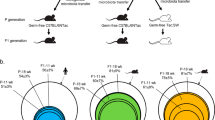Abstract
Barrier-raised transforming growth factor β1 (TGFβ1)-deficient mice consistently die before 35 days of age of a severe multiorgan inflammatory disease that can affect the skeletal muscle, heart, liver, pancreas, salivary gland, lung, oesophagus and stomach. The underlying cause of this disease is not known. To determine whether abnormal responsiveness of the immune system to the presence of enteric flora plays a causative role, a colony of TGFβ1-deficient and wild-type mice were raised in a sterile environment. Seven germ-free TGFβ1-deficient and 5 germ-free TGFβ1 wild-type mice were examined. Lesion development was analysed and compared with historical data on 50 barrier-raised TGFβ1 mutant mice and 32 barrier-raised wild-type mice. All germ-free TGFβ1-deficient mice died shortly after weaning, as do their barrier-raised counterparts. There was a significant delay in death in germ-free TGFβ1-deficient mice compared with barrier-raised mutant mice. However, there was no difference in the type, severity or incidence of lesions between TGFβ1 mutant mice raised under germ-free or barrier conditions. Germ- free wild-type mice had no lesions. It is concluded that microorganisms play a minimal role in disease induction in TGFβ1-deficient mice
Similar content being viewed by others
References
Balish, E. and Filutowicz, H. (1991) Serum antibody response of gnotobiotic athymic and euthymic mice following alimentary tract colonization and infection with Candida albicans. Can. J. Micro. 37, 204-10.
Boivin, G.P., O'Toole, B.A., Ormsby, I.E., Diebold, R.J., Eis, M.J., Doetschman, T.C. and Kier, A.B. (1995) Onset and progression of pathological lesions in transforming growth factorbeta-1-deficient mice. Am. J. Pathol. 146, 276-88.
Brandtzaeg, P. (1989) Overview of the mucosal immune system (Review). Current Top. Micro. Immunol. 146, 13-25.
Chin, Y.H., Cai, J.P. and Xu, X.M. (1992) Transforming growth factor-beta 1 and IL-4 regulate the adhesiveness of Peyer's patch high endothelial venule cells for lymphocytes. J. Immunol. 148, 1106-12.
Coffman, R.L., Lebman, D.A. and Shrader, B. (1989) Transforming growth factor betaspecifically enhances IgA production by lipopolysaccharide-stimulated murine B lymphocytes. J. Exp. Med. 170, 1039-44.
Dang, H., Geiser, A.G., Letterio, J.J., Nakabayashi, T., Kong, L., Fernandes, G. and Talal, N. (1995) SLE-like autoantibodies and Sjögren's syndrome-like lymphoproliferation in TGFβ knockout mice. J. Immun. 155, 3205-12.
Diebold, R.J., Eis, M.J., Yin, M., Boivin, G.P., Darrow, B., Saffitz, J. and Doetschman, T. (1995) Early onset multifocal inflammation in the TGFβ1-null mouse is lymphocyte mediated. Proc. Natl Acad. Sci. USA 92, 12215-19.
Frazier-Jessen, M., Christ, M., Panek, R.B., McCartney-Francis, N., Katona, I., Bauer, S., Kulkarni, A., Ward, J. and Wahl, S. (1995) Aberrant B lymphocyte function in TGF-β1(–/–) null mice. FASEB J. 9, A814.
Khoury, S.J., Hancock, W.W. and Weiner, H.L. (1992) Oral tolerance to myelin basic protein and natural recovery from experimental autoimmune encephalomyelitis are associated with downregulation of inflammatory cytokines and differential up regulation of transforming growth factor beta, interleukin 4, and prostaglandin E expression in the brain. J. Exp. Med. 176, 1355-64.
Kilshaw, P.J. and Murant, S.J. (1991) Expression and regulation of beta 7 (beta p) integrins on mouse lymphocytes: relevance to the mucosal immune system. Eur. J. Immunol. 21, 2591-7.
Kulkarni, A.B., Huh, C.G., Becker, D., Geiser, A., Lyght, M., Flanders, K.C., Roberts, A.B., Sporn, M.B., Ward, J.M. and Karlsson, S. (1993) Transforming growth factor beta1 null mutation in mice causes excessive inflammatory response and early death. Proc. Nat Acad. Sci. USA 90, 770-4.
Kulkarni, A.B., Ward, J.M., Yaswen, L., Mackall, C.L., Bauer, S.R., Huh, C.G., Gress, R.E. and Karlsson, S. (1995) Transforming growth factor-beta1 null mice. An animal model for inflammatory disorders. Am. J. Path. 146, 264-75.
Lebman, D.A., Lee, F.D. and Coffman, R.L. (1990) Mechanisms for transforming growth factor beta and IL-2 enhancement of IgA expression in lipopolysaccharide-stimulated B cell cultures. J. Immunol 144, 952-9.
Parker, C.M., Cepek, K.L., Russell, G.J., Shaw, S.K., Posnet, D.N., Schwarting, R. and Brenner, M.B. (1992) A family of beta 7 integrins on human mucosal lymphocytes. Proc. Natl Acad. Sci. USA 89, 1924-8.
Sadlack, B., Merz, H., Schorle, H., Schimpl, A., Feller, A.C. and Horak, I. (1993) Ulcerative colitis-like disease in mice with a disrupted interleukin-2 gene [see comments]. Cell 75, 253-61.
Shull, M.M., Ormsby, I., Kier, A.B., Pawlowski, S., Diebold, R.J., Yin, M., Allen, R., Sidman, C., Proetzel, G., Calvin, D., Annunziata, N. and Doetschman, T. (1992) Targeted disruption of the mouse transforming growth factor-beta1 gene results in multifocal inflammatory disease. Nature 359, 693-9.
Taurog, J.D., Richardson, J.A., Croft, J.T., Simmons, W.A., Zhou, M., Fernández-Sueiro, J.L., Balish, E. and Hammer, R.E. (1994) The germ free state prevents development of gut and joint inflammatory disease in HLA-B27 transgenic rats. J. Exp. Med. 180, 2359-64.
Ward, J.M., Anver, M.R., Haines, D.C., Melhorn, J.M., Gorelick, P., Yan, L. and Fox, J.G. (1996) Inflammatory large bowel disease in immunodeficient mice naturally infected with Helicobacter hepaticus. Lab. An. Sci. 46, 15-20.
Yale, C.E. and Balish, E. (1976) Blood and serum chemistry values of gnotobiotic beagles. Lab. An. Sci. 26, 633-9.
Author information
Authors and Affiliations
Rights and permissions
About this article
Cite this article
Boivin, G.P., Ormsby, I., Jones-Carson, J. et al. Germ-free and barrier-raised TGFβ1-deficient mice have similar inflammatory lesions. Transgenic Res 6, 197–202 (1997). https://doi.org/10.1023/A:1018490007745
Issue Date:
DOI: https://doi.org/10.1023/A:1018490007745




